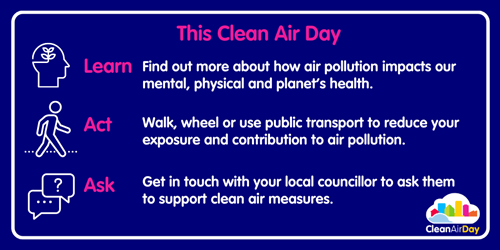Businesses have a vital role to play in improving air quality – and the UK’s Clean Air Day on 15 June is a great opportunity for companies to begin or renew their efforts in this area.
Opinion
The air we breathe is all our business
Cleaning up our air is vital for many reasons: alongside the benefits for our physical health and the planet of course, it can also protect our mental and brain health. The physical health impacts of air pollution – such as asthma, heart disease and cancers – have been recognised for decades. More recently, researchers are beginning to understand how air pollution can affect the brain and the mind.
When we breathe polluted air, small pollution particles can enter through our lungs, into our blood stream and can reach the brain, making us more likely to develop mental health and conditions such as depression, anxiety and dementia, as well as having a negative impact on cognitive function and cognitive performance.
“Now that we’re closer to understanding how air pollution impacts our mental and brain health and its burden on all our health, it’s extremely important that we tackle air pollution,” says Dr Malcolm White, clean air specialist at Global Action Plan.

Nicky O’Malley, director of corporate partnerships, Global Action Plan.
Taking action on this pressing challenge
Air pollution is an urgent sustainability challenge that demands the business community’s immediate attention as an explicit corporate responsibility. Companies need to not only start assessing and acting on their air pollution footprint in and around their real estate, but they also need to consider how their business model may be inadvertently contributing to greater levels of harmful air pollution.
Global Action Plan has created a ‘Clean Air mapping framework’ that acts as a great starting point in addressing your organisation’s own unique opportunity to outline its impacts on air pollution and consider developing suitable mitigating actions that address these.
With your impacts mapped out, the next step is convincing stakeholders of the need to take action...
The business case for action
1. Action on air pollution will help deliver net zero
Climate change and air pollution are interlinked and taking steps to improve our air quality will also help reduce greenhouse gas emissions. Renewable energy, more active travel, fewer and cleaner cars on the roads – these are all solutions that have the dual benefit of protecting human health from harmful air pollution as well as combating climate change.
As businesses accelerate their transition to net zero, there is an opportunity to make sure that we’re achieving a ‘win-win’ on health and the environment. A report produced by The Royal Society provided scientific evidence to support the design of policies that maximise the benefits for air quality at the same time as supporting progress towards net-zero greenhouse gas emissions by 2050.
The related summary presents policies with clear co-benefits for both air quality, climate change and also identifying possible mitigation measures that could be considered alongside net zero.
2. Recognising the impact on cognitive performance
New research into a lack of fresh air and business brain fog has been conducted by Durham University Business School alongside Beijing Jiaotong University. It found that firms based in a city with high levels of air pollution have much lower efficiency when it comes to corporate investments. The pollution, the researchers say, adversely impacts managers’ mood, judgement and decision-making on corporate investments.
As a result, firms are risking their profits.
This carries implications for anyone who makes decisions under pressure in polluted areas and may increase the global economic cost associated with air pollution. The World Bank estimates this cost to be US$8.1 trillion (£6.7 trillion) each year.
3. Supporting staff wellbeing
The UK would gain three million working days (thanks to fewer sick days) and £1.6 billion per year in economic benefits if it met the World Health Organization’s (WHO) air quality guidelines, according to CBI Economics research in 2020. These benefits would be even greater under the stricter guidelines released by the WHO more recently.
Collaboration is key – impact partnership opportunities
Global Action Plan works at the intersection of human and planetary health, collaborating with funders, partners and donors across the world to mainstream the positive narratives that demonstrate the reality of a healthy future for all.
Alongside our partners, we engage directly with sector challenges and the systems that underpin them. Together we’re able to share collective insight and change-initiatives with people, communities and decision-makers to deliver impact at a scale none of us could deliver alone.
In short, we mobilise movements.
“Clean air is a societal challenge, that requires action and collaboration across sectors to help protect health and tackle climate change,” says Larissa Lockwood, director of clean air at Global Action Plan. “We need business to both cut air pollution emissions and develop innovation solutions to enable clean air lifestyles, in the same way that leading companies have grasped carbon reduction.”
Across the next 12 months our dedicated Clean Air team will be focusing on areas of biggest impact for clean air quality in the UK to benefit people and planet. Alongside partners we will be:
- Exploring transformative opportunities for sectoral change across industries through collaboration with businesses committed to improving air quality
- Working alongside businesses who supply/support schools and education sector to develop a national air pollution strategy for schools
- Campaigning for home heating and cooking choices to be publicly recognised as sources of indoor air pollution, working alongside businesses to highlight solutions in both domestic and commercial settings.

Support the UK’s Clean Air Day on 15 June 2023
Global Action Plan coordinates the UK’s largest campaign on air pollution, Clean Air Day, this year taking place on 15 June with the theme “Let’s clean up the air so we can enjoy healthier, happier lives”.
Visit the Clean Air Hub to:
- Learn: find out more about how air pollution impacts our mental, physical and planet’s health
- Act: walk, wheel or use public transport to reduce your exposure and contribution to air pollution. If you drive, try leaving the car behind on Clean Air Day and one day every week
- Ask: get in touch with your local councillor to ask them to support clean air measures that make it easier for you to breathe clean air.
To explore working alongside us on delivering these impactful shifts, contact me at:
[email protected]
Free clean air resources, including a business mapping tool, are available at:
actionforcleanair.org.uk/business
Get involved in Clean Air Day 2023 at:
actionforcleanair.org.uk/campaigns/clean-air-day
OPINION

Battery Breakdown e-bike fire safety campaign: where are we two years on?
By Lesley Rudd, Electrical Safety First on 03 July 2025
The Product Regulation and Metrology Bill currently before Parliament offers the opportunity to reduce the fire risks posed by sub-standard e-bikes, e-scooters and their lithium-ion batteries, but the Government needs to go further and faster to protect public safety.

The building safety crisis: a year of Labour in power, still no end in sight for leaseholders
By Campaign team, End Our Cladding Scandal on 01 July 2025
It’s a year since Labour came to power with manifesto commitments to fix the failed approach to the cladding and building safety scandal and deliver meaningful change.

Rethinking workplace wellbeing for a new era
By Kate Field, BSI on 16 June 2025
Today’s workers increasingly value the flexibility to pick the most suitable working model for their needs – whether this be hybrid, fully remote or site-based. However, new BSI research shows a more important consideration is working for an organisation that genuinely prioritises employee wellbeing, offers development opportunities and encourages staff autonomy.



